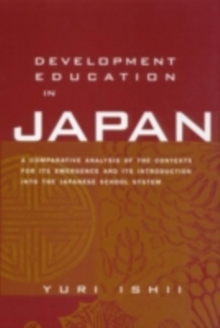
Japanese Model of Schooling : Comparisons with the U.S. Hardback
by Ryoko Tsuneyoshi
Part of the Reference Books In International Education series
Hardback
Description
In this book, Dr. Tsuneyoshi observes the educational approach of two nations, one most often cited as being the home of rugged individualism, and the champion of the free market, the other more often cited as being the most groupist amongst the industrialized societies, known for strong central guidance.
He argues that American approach individualizes assistance, is competitive, focuses on the child's cognitive sphere, differentiates its faculty, and each faculty deals with the child in a specialized sphere. Meanwhile, the Japanese approach stresses the whole child, places children and faculty in close proximity with each other for extended periods of time in a cooperative framework, levels of self-containment are higher, collective goals, tasks, and reward structures are extensively organized, and the school provides the same treatment for all.
Yet, despite such differences, Dr. Tsuneyoshi points out that we can notice many parallels, both in the contexts of education, and in the direction in which the two societies are headed.
Dr. Tsuneyoshi brings to light both similarities and differences, asking and attempting to answer the difficult question all educators are asking: What do we need to teach children for the 21st century?
Information
-
Out of stock
- Format:Hardback
- Pages:232 pages
- Publisher:Taylor & Francis Inc
- Publication Date:03/01/2001
- Category:
- ISBN:9780815336419
Other Formats
- EPUB from £36.44
- PDF from £36.44
Information
-
Out of stock
- Format:Hardback
- Pages:232 pages
- Publisher:Taylor & Francis Inc
- Publication Date:03/01/2001
- Category:
- ISBN:9780815336419










